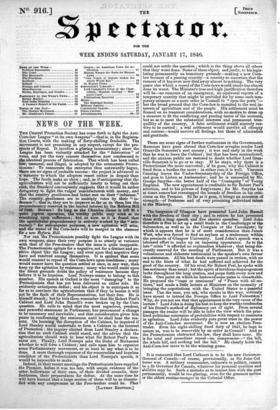NEWS OF THE WEEK.
THE Central Protection Society has come forth to fight the Anti- Corn-law League "at its own weapons"—that is, in the Registra- tion Courts, with the making of forty-shilling freeholds. The movement is not promising in any respect, except for the pro- spects of Repeal. It involves a glaring inconsistency; since the League has been violently attacked for the " fabrication" of votes, and yet the very censors themselves now condescend to the identical process of fabrication. That which has been called low, immoral, and illegal, is adopted by the aristocratic Protec- tionists ! To consecrate the enterprise thus untowardly begun, there are no signs of probable success : the project is advanced as a measure to which the adopters resort rather in despair than hope. The funds make no show ; and, as if anticipating that the agriculturists will not be sufficiently hearty to bring out their cash, the Standard conveniently suggests that it would be rather derogatory to figlit the vulgar manufacturers with money, and that the country gentlemen had better rest on their "influence." The country gentlemen are to multiply votes by their " in- fluence " : that is, they are to improve as far as in them lies the preponderancy reserved to the landed interest by the Reform Bill. of 1832. Beware ! So long as the Chandos clause is left to a quiet jogtrot operation, the worthy public may wink at its remaining upon sufferance; but as soon as it is found that the agricultural preponderancy is actively worked by the " aris- tocracy" for anti-popular purposes, a new agitation will arise, and the repeal of the Corn-laws will be merged in the clamour for a new Reform Bill.
Nor can the Protectionists possibly fight the League with its own weapons, since their very purpose is so utterly at variance with that of the Free-traders that the issue is quite inapposite. The Protectionists agitate for a negative, not for a distinct and po- sitive object like the League ; and even upon that negative they have not resolved among themselves. It is evident that some would consent to repeal of the Corn-laws upon conditions ; many would sooner have the question settled at once, in any way, than keep up the agitation by resistance ; many who would resist upon the direct grounds doubt the policy of resistance because they believe it to be hopeless. Lord Norreys seems to belong to this number. His speech at Oxford is the most " damaging" to the Protectionists that has yet been delivered on either side. He evidently anticipates defeat ; and his object is to anticipate it so far as to convince the agriculturists that if they be beaten it will not be the fault of their Representatives, but their fate. He is himself stanch ; but he bids them remember that Sir:Robert Peel's Cabinet and Lord John Russell's were broken up by the Corn question. He calls to mind that the most sagacious, prudent, and powerful statesman in Parliament, has pronounced a change to be necessary and inevitable ; and that consideration gives him pause in condemning the statesman until he shall hear the rea- sons. On learning the disruption of the Cabinet, he inquired if Lord Stanley would undertake to form a Cabinet in the interest of Protection : the inquiry elicited from Lord Stanley a declara- tion that no such Cabinet could stand, and the advice that the agriculturists should wait to hear what Sir Robert Peel's mea- sures are. Finally, Lord Norreys asks the Duke of Richmond whether he will form a Cabinet; and calls upon him to organize some Parliamentary movement, or at least to say what is to be done. A more thorough exposure of the resourceless and hopeless condition of the Protectionists than Lord Norreys's speech, it would be impossible to make. Indeed, in their recent meetings the Protectionists have supplied the Premier, before it was too late, with ample evidence of the utter hollowness of their case, of their divided councils, their feebleness, their preparedness for defeat. At the same time he will have learned that a large section of them will be as dissatis- fied with any compromise as the Free-traders could be. That could not settle the question ; which is the thing above all others that they want done. Some of them object, and justly, to his legis- lating permanently on transitory grounds—making a new Corn- law because of a passing scarcity—a scarcity so uncertain that the rumour of it has even now died away almost to nothing. The very panic also which a repeal of the Corn-laws would create has almost done its worst. The Minister's true and high justification therefore will be—no rumours of an emergency, no equivocal reports of a temporary scarcity that might be provided for by some such tem-
rporary measure as a mere order in Council to " open the ports "— it the broadground that the Corn-law is unsuited to the real in- terests of agriculture and of the people. His settlement must be framed on no transient considerations, with no motive to dress up a measure to fit the conflicting and passing tastes of the moment, but so as to meet the substantial interests and permanent tran- quillity of the country. A false settlement would scarcely sur- vive to be carried : a real settlement would survive all obloquy and contest—would survive all feelings but those of admiration and gratitude.


























